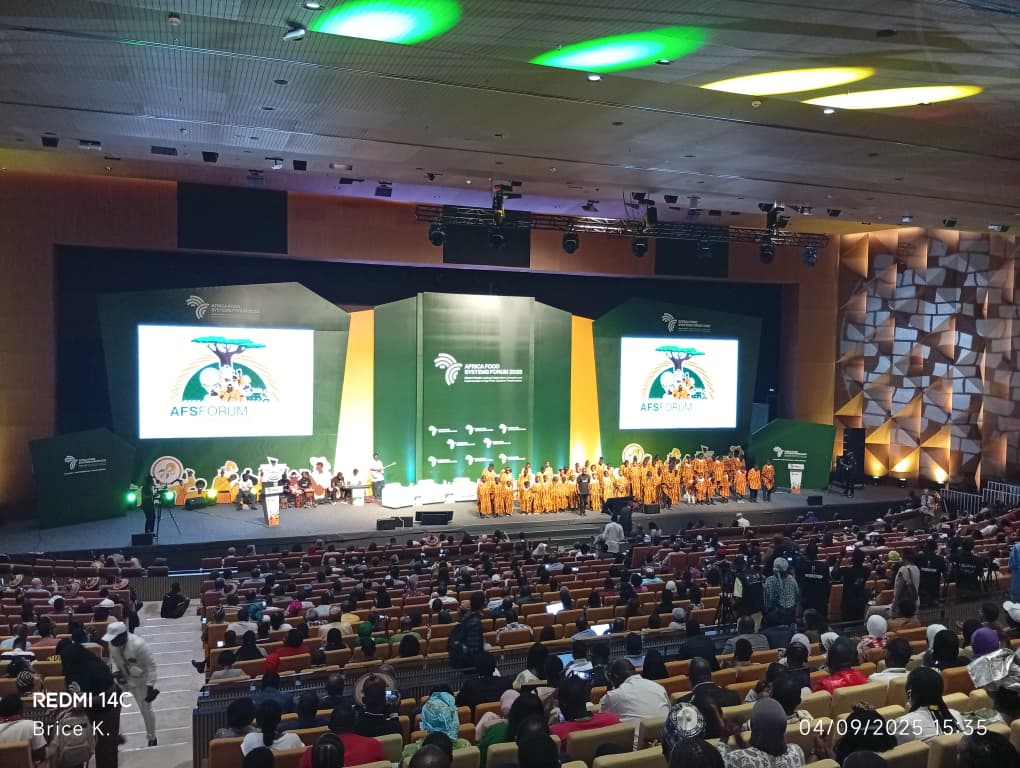Scaling Up Nutrition Civil Society Network (SUN CSN) Youth Leader Brice Kouderin travelled from Benin to Dakar, Senegal to attend the Africa Food Systems Forum summit, September 2025. Here he shares his reflections.
Last week, Dakar pulsed to the rhythm of the Africa Food Systems Forum 2025. Six days filled with encounters, debates and reflections on the challenges facing our African food systems. For me, it was much more than a conference: it was an immersion into an Africa in motion, full of creativity and resilience.
From the very first sessions, one strong idea stood out: the transformation of food systems cannot happen without local communities and without the energy of young people. This conviction ran through every speech, every exchange, every moment of sharing.
One of the highlights of the forum was the civil society roundtable. Actors from different countries and backgrounds gathered around a shared commitment: to carry the voice of communities.

Civil society at the heart of change
I was particularly struck by the words of Estelle Cohen, Chair of the Board of Directors of Heifer International. She powerfully reminded us that “the voice of rural communities is the backbone of any lasting transformation”. This message resonated with me as an obvious truth: behind every food policy, stand men and women, producers who, often in the shadows, feed our nations.
These discussions confirmed to me that civil society has an important role: not only to advocate for inclusive policies, but also to ensure that local initiatives are recognised, supported, and amplified.
Carrying the voice of communities on an international panel
One of the most significant moments of my journey at the forum was speaking as a panelist during the session “Facing climate change with improved nutrition: policy challenges and opportunities to protect and develop traditional food systems”.
It was an opportunity to present our community dialogues – unique spaces where families, young people and local leaders imagine together ways to respond to malnutrition and climate disruptions. I made it a point to stress that these initiatives are not just one-off projects, but real levers of lasting transformation.
I also emphasised a key issue: too often, decisions are made far from the field. Yet it is imperative that public policies integrate local knowledge, agroecological practices and the aspirations of rural communities. The transformation of food systems must not be imposed from by decision makers, but built together with those who live and cultivate the land every day.
For me, this panel was a privileged moment to affirm that young people and civil society are not passive beneficiaries, but essential actors. Their contribution is vital to move from promises to concrete actions.
Initiatives that inspire and restore hope
Beyond the panels and debates, this forum was a true crossroads of innovation. I met young leaders transforming their villages through agroecological projects, women developing local nutritional solutions, and researchers translating their findings into actions accessible to communities.
These encounters gave me a deep sense of hope: Africa already has the talent, the ideas and the solutions to face its food challenges. The role of networks such as SUN CSN is to give more visibility to these initiatives and connect them to regional and international dynamics.
What can decision makers learn from this?
From this experience, I draw three key lessons for decision makers:
- Listen to and include local communities more in decision-making processes.
- Strengthen synergies between young people, women, producers and policymakers to build solid alliances.
- Move to action, ensuring that the promises made in forums translate into real change on the ground.
A conviction that stays with me
As I leave Dakar, I return with renewed energy and ideas brimming in my mind. But above all, I return with the conviction that our work must not stop at conferences. Dialogues must continue in villages, where ideas come to life and become reality. African food systems will not be transformed from the top down: they will be built together, step by step, with everyone’s commitment.
Building the future here and now
If I had to summarise my experience in one sentence, it would be: change is possible, but it begins with listening to communities and supporting those who feed Africa every day. For SUN CSN, this week is a reminder that our role is to continue highlighting local initiatives, strengthening the participation of young people and women, and building bridges between grassroots actors and international platforms.
The future of our food systems is being built here, with us, now.


